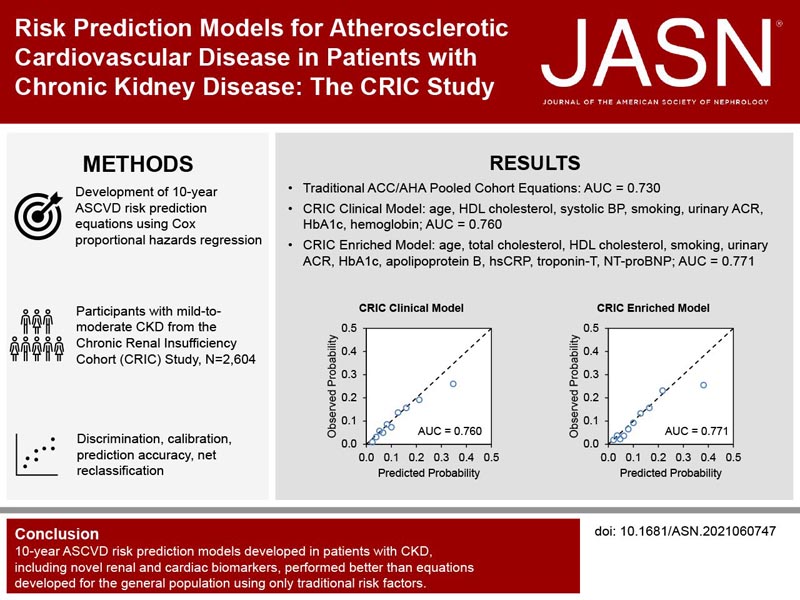Statement of importance Patients with CKD are generally considered to be at high risk for atherosclerotic cardiovascular disease, but CKD is a heterogeneous condition and there are no validated atherosclerotic cardiovascular disease risk stratification tools for this population. Our analysis of 2,604 participants in the Chronic Kidney Failure Cohort study found that newly developed risk prediction models, using clinically available variables and novel biomarkers, improved discrimination, calibration, and reclassification of null events compared to the traditional American College of Cardiology/American Heart Association pooled cohort equations developed for the general population. The new equations may improve risk stratification in patients with CKD and improve shared decision-making for preventive therapy to reduce the incidence and mortality of atherosclerotic cardiovascular disease. |
Several factors not included in previous prediction models were important for predicting atherosclerotic cardiovascular disease among patients with chronic kidney disease. Adding these factors could help doctors and patients make decisions related to heart disease prevention.
A new study reveals that changes to models that predict the risk of developing cardiovascular problems in the general population can help doctors improve risk prediction in people with kidney disease. The findings, published in JASN , may be used to help protect the heart health of patients with kidney disease.
People with chronic kidney disease (CKD) often develop atherosclerotic cardiovascular disease (CVD), such as strokes and heart attacks, but common prediction tools to determine a person’s CVD risk were developed for the general population and can be that do not include certain factors relevant to patients with CKD.
Improving CVD risk prediction in CKD patients may help identify those in this growing population who are truly at high risk, as well as identify those who are at low risk and less likely to benefit from interventions. invasive.

A team led by Jiang He, MD, PhD and Joshua D. Bundy, PhD, MPH (Tulane University School of Public Health and Tropical Medicine) aimed to create new equations using many clinically available variables and new biomarkers that can be especially important in patients. with CKD.
In the researchers’ analysis of 2,604 participants in the Chronic Kidney Disease Cohort Study, they found that several factors not included in previous prediction models were important for predicting atherosclerotic CVD among patients with CKD.
These included measures of long-term glycemia (HbA1c), inflammation (high-sensitivity C-reactive protein), kidney injury (urinary albumin-creatinine ratio), and cardiac injury (troponin-T and NT-proBNP).
“We created two new prediction tools for CKD patients: the first is a simple model that includes factors routinely measured by healthcare providers and the second is an expanded model with additional variables particularly important for CKD patients, including long-term blood measurements. sugar, inflammation, and kidney and heart injuries,” Dr. He said.
"We found that the new models can better classify patients who will or will not have a stroke or heart attack within 10 years compared to standard models."
“New tools can better assist healthcare providers and CKD patients in shared decision-making for heart disease prevention,” Dr. Bundy added.
Conclusions 10-year ASCVD risk prediction models developed in CKD patients, including new renal and cardiac biomarkers, performed better than equations developed for the general population using only traditional risk factors. |
















